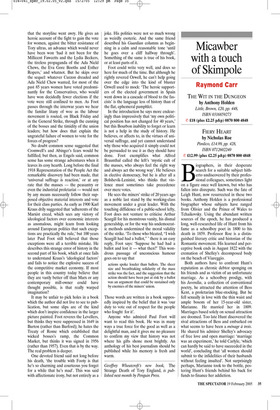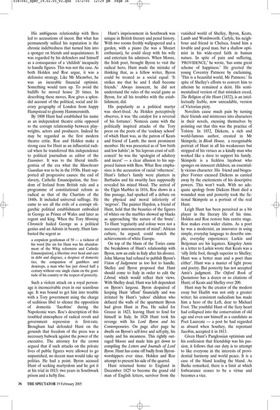Micawber with a touch of Skimpole
Raymond Carr
THE WIT IN THE DUNGEON by Anthony Holden Little, Brown, £20, pp. 448, ISBN 0316859273 ✆ £18 (plus £2.25 p&p) 0870 800 4848 FIERY HEART by Nicholas Roe Pimlico, £14.99, pp. 428, ISBN 0712602240 ✆ £12.99 (plus £2.25 p&p) 0870 800 4848 Biographers, in their desperate search for a suitable subject hitherto undiscovered by their professional colleagues, sometimes light on a figure once well known, but who has fallen into disrepute. Such was the fate of Leigh Hunt, now resurrected in these two books. Anthony Holden is a professional biographer whose subjects have ranged from Olivier and the Prince of Wales to Tchaikovsky. Using the abundant written sources of the epoch, he has produced a long, well-researched life of Hunt from his fame as a schoolboy poet in 1800 to his death in 1859. Professor Roe is a distinguished literary critic and historian of the Romantic movement. His learned and perceptive book ends in August 1822 with the cremation of Shelley’s decomposed body on the beach of Viareggio.
Both authors have to confront Hunt’s reputation as chronic debtor sponging on his friends and as victim of an unfortunate marriage. As a schoolboy prodigy, with his Juvenilia, a collection of conventional poetry, he attracted the attention of Bess Kent, a proletarian blue-stocking. But he fell sexually in love with the thin waist and ample bosom of her 15-year-old sister, Marianne. He married her in 1809. Marriages based solely on sexual attraction are doomed. Too late Hunt discovered the rival attractions of Bess and embarked on what seems to have been a ménage à trois. He shared his admirer Shelley’s advocacy of free love and open marriage: ‘marriage was an experiment,’ he told Carlyle, ‘which can hardly be said to have succeeded in the world’, concluding that ‘all women should submit to the infidelities of their husbands without feeling insulted’. Not surprisingly perhaps, Marianne took to the bottle, pestering Hunt’s friends behind his back for funds to finance her addiction. His ambiguous relationship with Bess led to accusations of incest. But what has permanently sullied his reputation is the chronic indebtedness that turned him into a sponger on friends and acquaintances. It was regarded by his defenders and himself as a consequence of a ‘childish’ incapacity to handle figures. This was not the case. As both Holden and Roe argue, it was a defensive strategy. Like Mr Micawber, he was an incurable financial optimist. Something would turn up. To avoid the bailiffs he moved house 20 times. In describing these moves, Roe gives a splendid account of the political, social and literary geography of London from happy Hampstead to gloomy Hammersmith.
By 1808 Hunt had established his name as an independent theatre critic opposed to the corrupt relationship between playwrights, actors and producers. Indeed he may be regarded as the first modern theatre critic. Roe and Holden make a strong case for Hunt as an influential radical when he transferred this independence to political journalism as editor of the Examiner. It was to the liberal intelligentsia of the era what the Manchester Guardian was to be in the 1930s. Hunt supported all progressive causes: the end of slavery, Catholic Emancipation, the freedom of Ireland from British rule and a programme of constitutional reform as radical as that of the Chartists of the 1840s. It included universal suffrage. He came to see all the evils of a corrupt oligarchic political establishment embodied in George as Prince of Wales and later as regent and king. When the Tory Morning Chronicle hailed George as a political genius and an Adonis in beauty, Hunt lambasted the regent as
a corpulent gentleman of 50 — a violator of his word [his sin for Hunt was his abandonment of the Whig reformists and Catholic Emancipation], a libertine over head and ears in debt and disgrace, a despiser of domestic ties, the companion of gamblers and demireps, a man who has just closed half a century without one single claim on the gratitude of his country or the respect of posterity.
Such a violent attack on a royal personage is inconceivable even in our scurrilous age. It was bound to get him into trouble with a Tory government using the charge of seditious libel to silence the opposition of domestic ‘Jacobins’ during the Napoleonic wars. Roe’s description of this troubled atmosphere of radical revolt and government repression is first-rate. Brougham had defended Hunt on the grounds that freedom of the press was a necessary bulwark against the power of the executive. The attorney for the crown argued that if such attacks on the private lives of public figures were allowed to go unpunished, no decent man would take up politics. He had a point. Byron accused Hunt of seeking martyrdom and he got it at his trial in 1813: two years in Southwark prison and a hefty fine. Hunt’s imprisonment in Southwark was unique in British literary and penal history. With two rooms freshly wallpapered and a garden, with a piano (he was a Mozart enthusiast), he could sleep with his wife and entertain his admirers. When Moore, the Irish poet, brought Byron to visit the radical hero, Hunt made the mistake of thinking that, as a fellow writer, Byron could be treated as a social equal: ‘It strikes me that he and I shall become friends.’ Always innocent, he did not understand the rules of the social game as Byron, for all his troubles with the establishment, did.
His popularity as a political martyr was short-lived. As Holden perceptively observes, it was ‘the catalyst for a reversal of his fortunes’. Nemesis came with the politically inspired attacks of the Tory press on the poets of the ‘cockney school’ of which Hunt was, as the patron of Keats and friend of Lamb, the most prominent member. He was presented as of ‘low birth and low habits’; in ‘his leprous crust of selfconceit’ he was the ‘apologist of adultery and incest’ — a clear allusion to his supposed liaison with Bess. What Roe emphasises is the accusation of racial ‘otherness’. Hunt’s father’s family were planters in Barbados and his swarthy face supposedly revealed his mixed blood. The arrival of the Elgin Marbles in 1816, Roe shows in a fine passage, had sparked off a debate on the physical and moral inferiority of ‘negroes’. The painter Haydon, a friend of Hunt, held that the beauties of the figures of whites on the marbles showed up blacks as approaching ‘the nature of the brute’. To Hunt ‘regularity and colour were not a necessary announcement of mind’; African culture, he argued, could match the achievements of white Europe.
On top of the blasts of the Tories came the breakdown of Hunt’s relationship with Byron, now an exile in Italy after his divorce. John Murray had refused to publish Byron’s Vision of Judgement as too hot to handle. Shelley and Byron proposed that Hunt should come to Italy in order to edit the Liberal, which would reflect their views. With Shelley dead, Hunt was left dependent on Byron’s largesse. Byron despaired of keeping Hunt ‘afloat’ financially and was irritated by Hunt’s ‘yahoo’ children who defaced the walls of the apartment Byron had given Hunt in Pisa. He sailed for Greece in 1823, leaving Hunt to fend for himself in Italy. In 1828 Hunt took his revenge with his Lord Byron and his Contemporaries. On page after page he dwells on Byron’s self-love and self-pity, his vanity and his meanness. This rightly outraged Moore and made him get down to compiling the Letters and Journals of Lord Byron. Hunt has come off badly from Byronworshippers ever since. Holden and Roe attempt to present his side of the quarrel.
Hunt returned home to England in December 1825 to become the grand old man of English letters, survivor from the vanished world of Shelley, Byron, Keats, Lamb and Wordsworth. Carlyle, his neighbour and friend in Chelsea, found him a lovable and good man, but a shallow optimist in his wide-eyed faith in human nature. In spite of pain and suffering, ‘PROVIDENCE,’ he wrote, ‘has some great scheme of happiness.’ He greeted the young Coventry Patmore by exclaiming, ‘This is a beautiful world, Mr Patmore.’ In spite of Shelley’s efforts to convert him to atheism he remained a deist. His sentimentalised version of that mistaken creed, The Religion of the Heart (1832), is an intellectually feeble, now unreadable, version of Victorian piety.
Novelists cause much pain by turning their friends and mistresses into characters in their novels, excusing themselves by pointing out that this was the practice of Tolstoy. In 1852, Dickens, a rich and world-famous author, created in Mr Skimpole, in Bleak House, a recognisable portrait of Hunt in all his weaknesses but stripped of his virtues as a kindly man who worked like a slave to support his family. Skimpole is a feckless layabout who sponges on innocent children, an essentially vicious character. His friend and biographer Forster excused Dickens as carried away by the excitements of his descriptive powers. This won’t wash. With no adequate apology from Dickens Hunt died a wounded man and posterity took the fictional Skimpole as a portrait of the real Hunt.
Leigh Hunt has been perceived as a bit player in the literary life of his time. Holden and Roe restore him centre stage. Roe makes even wider claims. As a poet he was a modernist, an innovator in using simple, everyday language to describe simple, everyday experiences; Larkin and Betjeman are his legatees. Kingsley Amis in a letter to Larkin wrote that Keats was a ‘silly little fool, though superior to Shelley; Hunt was a better man and a poet than either’. Hunt was a master of light prose and poetry. But posterity has not accepted Amis’s judgment. The Oxford Book of Quotations has a dozen or so citations of Hunt; of Keats and Shelley over 200.
Hunt may be the creator of the modern essay but Hazlitt was not only a greater writer; his consistent radicalism has made him a hero of the Left, dear to Michael Foot. The youthful Hunt of the fiery heart had collapsed into the conservatism of old age and even saw himself as a candidate as Poet Laureate — a post he had regarded as absurd when Southey, the repentant Jacobin, accepted it in 1813.
Given Hunt’s Panglossian optimism and his confession that friendship was his passion, it follows that our duty is to attempt to like everyone in the interests of providential harmony and world peace. It is a case of the bland leading the bland. As Burke remarked, there is a limit at which forbearance ceases to be a virtue and becomes a vice.


















































 Previous page
Previous page